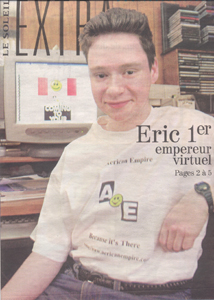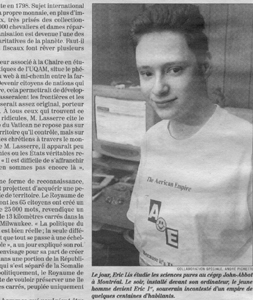This article from Le Soleil of Quebec City, Canada, was published on January 18, 2001. Because the article was written in the province of Quebec, home of the Embassy to Everything Else, the article focuses on the Empire to a great degree.
On this page, you will find:
1: The article, as it appeared on the Le Soleil website, in french.
2: An english translation
3: Other pictures which appearerd in the paper but not on the webpage.
 | |
| Collaboration speciale, Andre Pichette | |
| Le jour, Eric Lis etudie les sciences pures au cegep John-Abbot a Montreal. Le soir, installe devant son ordinateur, le jeune homme devient Eric 1er, souverain inconteste d'un empire de quelques centaines d'habitants. |
Vive Eric 1er, empereur virtuel !
En moins de dix ans, un millier de pays imaginaires ont vu le jour sur Internet
Jean-Simon Gagne - JSGagne@lesoleil.com
CYBER ESPACE - En moins de dix ans, un millier de pays imaginaires ont vu le jour sur la toile d'Internet. Un univers parallele a mi-chemin entre le Jardin d'Eden et l'hopital psychiatrique. La visite vous interesse ? Embarquement immediat.
Le jour, Eric Lis etudie les sciences pures au cegep John-Abbot, dans la region de Montreal. Le soir, installe devant son ordinateur, le jeune homme devient Eric 1er, souverain inconteste d'un empire de quelques centaines d'habitants. Le jour, Eric Lis doit faire la file a la cafeteria et payer ses factures, comme tout le monde. Le soir, Eric 1er consulte ses ministres par courrier electronique, regle les affaires courantes de sa nation et correspond avec ses loyaux sujets. Le jour, le malheureux Eric Lis est un citoyen canadien a peu pres comme les autres. Le soir, le fabuleux Eric 1er dirige sur le web un pays surgi de son imagination debordante, une nation qui n'apparait sur aucune carte de monde : l'empire Aerican.
Un peu megalo, l'empereur Eric ? Peut-etre bien, apres tout. L'idee de fonder un empire lui serait venu a cinq ans, un age ou la plupart des enfants caressent plutot le reve d'apprendre a lire ou a lacer leurs chaussures. Treize ans plus tard, grace a Internet, l'empereur s'est trouve meme de vrais citoyens pour peupler son pays virtuel. Trois cent cinquante-sept, selon ses calculs. " Je vois mon empire comme une communaute, un endroit ou peuvent discuter des gens qui partagent des valeurs semblables. Tout se deroule de facon tres democratique, entre la farce et le serieux , resume le monarque. On a deja compare l'empire Aerican a un film des Monty Python. Pour meubler la spiritualite de son peuple, l'empereur a ainsi cree un dieu, le Grand Pingouin, auquel il a invente des prieres loufoques. Il revendique aussi le nord de la planete Pluton. C'est tout dire.
Eric Lis ne constitue qu'un cas parmi d'autres. Ces dernieres annees, toutes sortes d'originaux ont declare l'independance de leur chambre a coucher ou de leur demi-sous-sol de prefini. De la monarchie absolue a la dictature communiste en passant par l'embryon d'un futur empire intergalactique, tous les regimes politiques ou presque se cotoient sur le web. Le passe telescope l'avenir. Le capitaine Spock se prend pour Staline. Les militants des droits de l'homme voisinent les ados qui jouent a Bilbo le Hobbit. Une republique s'adressait jusqu'a tout recemment aux amateurs de chocolat, avec pour hymne national Que Dieu sauve notre barre chocolatee. Une autre a adopte le trench-coat et les lunettes de soleil comme costume ethnique. Parmi les trouvailles originales, citons le Royaume de Jupiter, la Nation homard, l'etat independant de la vache bleue ou la Patrie independante des fumeurs de pot. " Du sublime au ridicule, il n'y a souvent qu'un geste ", disait Napoleon 1er, qui n'avait pourtant rien d'un souverain virtuel, convenez-en.
existence mouvementee
Bon nombre de micronations du web menent une existence aussi mouvementee qu'imprevisible, au gre des lubies de leurs souverains autoproclames. En 1998, on a vu un etat, l'Empire sacre de la Reunion, en annexer deux autres au terme d'un referendum ! La meme annee, une dizaine d'etats se sont aussi reunis pour former la Ligue monarchiste. Sans parler des vire-capots. L'ete dernier, le monarque Levi 1er, tsar inconteste de la Nation communiste d'Artenya, s'est soudainement converti a la democratie. " Je desire vous informer que d'importants bouleversements politiques surviendront prochainement au sein de la Nation, a explique le tsar penaud au reste du monde. J'ai realise que mes visees communistes etaient mauvaises. J'opte desormais pour une nouvelle republique democratique. "
Malgre leur faible pour l'apparat et le tape-a-l'oeil, toutes les micronations du web ne s'apparentent pas a ces plaisanteries grotesques. La Republique de Lomar, par exemple, affirme travailler pour les droits de l'homme et compte environ 5000 citoyens. Comme la plupart des etats independants, elle delivre des passeports, emet des timbres et bat sa propre monnaie. Une partie des profits realises sont versees au gouvernement tibetain en exil. a terme, la Republique vise une population de 50 000 individus, ce qui lui permettrait de devancer 28 petits etats membres des Nations unies, notamment le Liechtentstein, Saint-Marin et Monaco. Lomar espere un jour obtenir une reconnaissance officielle des Nations-unies et jouer un role dans le rapprochements des peuples ainsi que la transmission du avoir.
un modele celebre
Pour entretenir les espoirs de ses citoyens, Lomar peut se reclamer d'un modele fameux de gouvernement sans territoire : l'Ordre des Chevaliers de Malte. Fonde il y a neuf siecles, a l'epoque de la premiere croisade, l'Ordre possede des ambassadeurs dans 75 pays et jouit d'un statut d'observateur permanent aux Nations unies. L'organisation presente toutes les caracteristiques d'un pays, malgre son expulsion de l'ile de Malte en 1798. Sujet international de droit public, l'Ordre bat sa propre monnaie, en plus d'imprimer ses timbres postaux, tres prises des collectionneurs. Avec ses quelque 11 000 chevaliers et dames repartis a travers le monde, l'organisation est devenue l'une des principales organisations caritatives de la planete. Faut-il preciser que ses privileges fiscaux font rever plusieurs souverains du web ?
Phillippe Lasserre, chercheur associe a la Chaire en etudes strategiques et diplomatiques de l'UQAM, situe le phenomene des micronations du web a mi-chemin entre la farce et la vision de l'avenir. " Devenir citoyens de nations qui ne possedent pas de territoire, cela permettrait de developper des allegeances qui depasseraient les frontieres et les barrieres linguistiques. Ce serait assez original, porteur d'espoir pour l'Humanite ". a tous ceux qui trouvent ce genre d'idees parfaitement ridicules, M. Lasserre cite le cas du Vatican. " L'audience du Vatican ne repose pas sur la tres petite superficie de territoire qu'il controle, mais sur la communaute de valeurs des chretiens a travers le monde ". Pour l'instant, concede M. Lasserre, il apparait peu probable que les Nations-Unies ou les etats veritables reconnaissent un pays virtuel. " Il est difficile de s'affranchir de la geographie. Nous n'en sommes pas encore la ", conclut-il.
Dans l'espoir d'obtenir une forme de reconnaissance, beaucoup de pays d'Internet projettent d'acquerir une petite parcelle de territoire. Le Royaume de Talossa, dont les 65 citoyens ont cree un langage de 25 000 mots, revendique un territoire de 13 kilometres carres dans la region de Milwaukee. " La politique du notre etat est bien reelle ; la seule difference, c'est que tout se passe a une echelle plus petite et plus accessible ", a un jour explique son roi. La republique de Freedonia envisage pour sa part de creer un paradis ultracapitaliste dans une portion de la Republique de Somaliland, un etat qui s'est separe de la Somalie en 1991. Moins developpe politiquement, le Royaume de l'ile de Saint-Paul se contente de vouloir preserver une ile volcanique de sept kilometres carres, peuplee uniquement d'oiseaux.
Dans un essai intitule Les hommes qui voulaient etre rois, Philippe Lasserre soutient que les nations virtuelles peuvent permettre a des individus de reprendre en main un debat politique qui leur echappe. Il rappelle cependant que " le desir de quelques esprits aventuriers ou ambitieux de creer de petits etats separes dont ils deviendraient les rois ou les presidents, n'est pas recent ". En 1977, un citoyen francais, mecontent du rattachement de l'ile de Barbe au 9e arrondissement de la ville de Lyon, proclame la republique de l'ile de Barbe. En 1837, lors de la rebellion contre l'autorite britannique dans le Haut-Canada, William Lyon Mackenzie avait trouve refuge sur une ile de la riviere Niagara, dont il avait aussitot decrete l'independance. Plus pres de nous, on se souviendra de l'election d'un roi dans la municipalite de l'Anse-Saint-Jean.
" On a la politique de sa geographie ", repetait a l'envie Bismarck. Depuis dix ans, un millier de nations virtuelles du web font le pari qu'il avait tort.
Qui sait si l'avenir ne leur donnera pas raison ?
 | |
| Special collaboration, Andre Pichette | |
| By day, Eric Lis studies natural sciences at cegep John-Abbot, in the area of Montreal. By evening, installed in front of his computer, the young man becomes Eric the 1st, uncontested sovereign of an empire of a few hundred of inhabitants. |
Long Live Eric the 1st, virtual emperor!
In less than ten years, a thousand of imaginary countries were born on Internet
Jean-Simon Gagne-- JSGagne@lesoleil.com
CYBER SPACE - In less than ten years, a thousand imaginary countries were born in the fabric of the Internet. A parallel universe halfway between the Garden of Eden and the psychiatric hospital. Does a visit interest you? Immediate loading.
By day, Eric Lis studies natural science at cegep John-Abbot, in the area of Montreal. By evening, installed in front of his computer, the young man becomes Eric the 1st, uncontested sovereign of an empire with a few hundred inhabitants. By day, Eric Lis must line up at the cafeteria and pay his bills, like everyone. By evening, Eric the 1st consults his ministers by electronic mail, regulates the current business of his nation and corresponds with his honest subjects. By day, the unhappy Eric Lis is a Canadian citizen about like the others. By evening, the fabulous Eric the 1st directs on the Web an emerging country of his wild imagination, a nation which does not appear on any map of world: the Aerican empire.
A little megalomaniacal, the emperor Eric? Perhaps very, after all. The idea to found an empire came to him at five years, an age where the majority of the children cherish the dream of learning how to read or to tie their shoes. Thirteen years later, thanks to Internet, the emperor was even even found citizens to populate his virtual country. Three hundred eighty seven, according to his calculations "I see my empire like a community, a place where people who share similar values can talk. All is run in a very democratic way, between a joke and a serious life", summarizes the monarch. Some have already compared the Aerican empire with the films of Monty Python. To furnish spirituality with his people, the emperor thus created a god, the Great Penguin, to which he invented slightly insane prayers. He even claims the north of the planet Pluto.
Eric Lis is only one case among many. These last few years, all kinds of originals claimed the independence of their bedroom or their basement. Absolute monarchy of a communist dictatorship or a future intergalactic empire, all the political models or almost all are contained on the Web. The past shows us the future. Captain Spock is mistaken for Stalin. The militant supporters of humans rights are next door to Bilbo the Hobbit. A republic found until very recently was for lovers of chocolate, witch for national anthem had God save our chocolate bar.. Another adopted the trench coat and the sunglasses as ethnic costume. Among the original lucky finds, let us look at the Kingdom of Jupiter, the Lobster Nation, the independent state of the blue cow or the independent Fatherland of the smokers of pot. "Between the sublime and the ridiculous, there is often only one gesture", said Napoleon 1st, and though he did not have anything virtual to his sovereignty, the words are appropriate.
animated existence
Many micronations of the Web carry out an existence as animated as unforeseeable, on the whims of their self proclaimed sovereigns. In 1998, one state, the holy empire of Reunion, annexed two others at the end of a referendum! The same year, ten States also met to form the Monarchist League. Last summer, the monarch Levi the 1st, uncontested tsar of the communist Nation of Artenya, suddenly converted to democracy. "I wish to inform you that significant political upheavals will occur soon within the Nation," explained the tsar to the rest of the world. "I realized that my communist aimings were bad. I choose to be a new democratic republic from now on."
In spite of their weakness for pageantry and slapstick, not all the micronations of the Web are connected with these grotesque jokes. The Republic of Lomar, for example, affirms to work for humans rights and boasts approximately 5000 citizens. Like the majority of independent States, it delivers passports, prints stamps and coins its own currency. Part of the profits earned are shared with the tibetain government in exile. Long term, the Republic aims at a population of 50 000 individuals, which would be more people than 28 small Member States of the United Nations, in particular Liechtentstein, Saint-Marin and Monaco. Lomar expects one day to obtain an official recognition from the United Nations and to play a role in bringing people together.
A famous model
To maintain the hopes its citizens, Lomar can claim a famous model of government without territory: the Command of the Knights of Malta. Founded nine centuries ago, at the time of the first crusade, the Command has ambassadors in 75 countries and enjoys a statute of permanent observer in the United Nations. The organization has all the characteristics of a country, in spite of its expulsion from the island of Malta in 1798. International subject of public rights, the Command beats its own currency, in addition to printing postal stamps, very popular with collectors. With its some 11 000 knights and ladies distributed throughout the world, the organization became one of the principal freedom organizations of planet. Need it be said that many rulers on the web dream of riches?
Phillippe Lasserre, researcher associated with Chair of strategic and diplomatic studies of the UQAM, partially associates the phenomenon of micronations on the Web as being between a joke and a vision of the future. "To become citizens of nations which do not have a territory, that would make it possible to develop allegiances which would exceed borders and linguistic barriers. It would be rather original, carrying hope for Humanity". For all those whp find this kind of idea perfectly ridiculous, Mr. Lasserre quotes the case of the Vatican. "The Vatican does not rest on the very small surface of territory which it controls, but on the community and values of the Christians throughout the world". For the moment, concedes Mr. Lasserre, it appears not very probable that the United Nations or the true nations will recognize a virtual country. "It is difficult to be freed from the geography. We are not yet there", he concludes.
In the hope to obtain a form of recognition, most Internet nations try to acquire a small piece of territory. The Kingdom of Talossa, whose 65 citizens created a language of 25 000 words, asserts a territory of 13 square kilometres in the area of Milwaukee. "the policy of the our State is quite real; the only difference is that all occurs on a smaller and more accessible scale", the king has explained. The republic of Freedonia plans for its part to create an ultracapitalist paradise in a portion of the Republic of Somaliland, a State which separated from Somalia in 1991. Less politically developed, the Kingdom of the island of Saint-Paul is satisfied to want to preserve a volcanic island of seven square kilometres, only populated birds.
In an essay entitled Les hommes qui voulaient etre rois, Philippe Lasserre supports that the virtual nations can allow individuals to take again in hand a political debate which escapes them. He recalls however that "the desire of some adventurous or ambitious spirits to create small separate States of which they would become kings or presidents is not recent". In 1977, a French citizen, dissatisfied with the fastening of the island of Barb to the 9th district of the town of Lyon, proclaimed the republic of the Island of Barb. In 1837, at the time of the rebellion against the British authority in Upper-Canada, William Lyon Mackenzie found refuge on an island of the Niagara river, where he reclaimed independence once more. Closer to us, one might remember the election of a king in the municipality of l'Anse-Saint-Jean. "We have the politics of geography," said Bismarck with desire. For ten years, a thousand virtual nations of the Web have bet he was wrong.
Who knows if the future might prove them right?

The front page of Le Soleil.

The front page of the section in which the article ran.

A picture from the article itself.
Back to the Aerica main page Back to the Museum!
